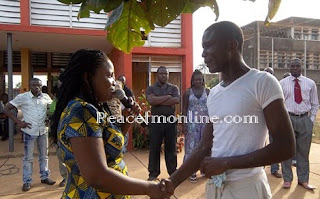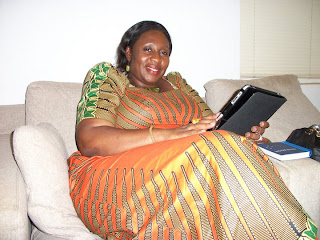63 Remand Prisoners Set Free
Sixty-three remand prisoners at the Nsawam Medium Security Prison whose cases have not been heard since their incarceration have been granted unconditional release under the Justice For All Programme.
Thirty-two others whose warrants have expired have also been granted bail because their dockets cannot be traced.
However, one remand prisoner was convicted, while four cases that merited prosecution were adjourned.
The Executive Director of the Centre for Human Rights and Civil Liberties (CHURCIL), a human rights non-governmental organisation (NGO), Mr Kojo Graham, told the Daily Graphic in Accra that those who were granted bail last Friday and met the conditions were required to report themselves regularly to police stations within their localities.
He said that a team of police personnel and investigators collected detailed information on the released prisoners, particularly those on bail, in an effort to monitor their activities.
Three Appeal Court judges, namely, Justice C.J. Honyenuga, Justice Duose and Justice E.K. Ayebi, sat as additional High Court judges, while Justice Ajet-Nasam, Justice Abdullah Iddrisu, Justice Ofori Atta and Justice Janapare B. Kodwo, all High Court judges, were assigned to various courts at the Nsawam Prison to adjudicate the cases.
Two justices of the Supreme Court — Justice Sophia Adinyira and Justice B.T. Aryeetey — supervised the proceedings with a team of prosecutors from the Attorney-General’s Department, led by Ms Amerley Wood.
Their release, according to Mr Graham, followed the filing of 113 motions at the High Court last December.
The Justice For All Programme, introduced in 2007, is a co-ordinated effort among the Attorney-General’s Department, the Judicial Service, the Ghana Police Service and civil society organisations, represented by CHURCIL, to decongest the prisons through the speedy adjudication of remand cases.
A team of lawyers from CHURCIL, comprising Mr Kojo Graham, Mr Andrew Daniels, Mr Eric Alifo, Mr George Agbeko and Mr David Van-Dyke, provided pro bono legal representation for the prisoners, who were said to have been ‘unjustifiably’ imprisoned for periods ranging from five to 10 years.
The intervention by CHURCIL is in consonance with Article 14, Section 4 of the 1992 Constitution, which states, “Where a person arrested, restricted or detained under Paragraph A or B of this article is not tried within a reasonable time, then without prejudice to further proceedings that may be brought against him, (he) should be released unconditionally or upon reasonable conditions, including in particular conditions reasonably necessary to ensure that he appears at a later date for trial or proceedings preliminary to trial.”
In that connection, Mr Graham argued that the continued detention of the prisoners whose dockets could not be traced and others whose warrants had expired amounted to a violation of their fundamental human rights.
He expressed the hope that there would be sitting for the next exercise scheduled for July this year before the end of the legal session and one in the last quarter for the year.
“Discussions are underway to extend prison courts to Kumasi, Ho, Tamale and Cape Coast,” he added, and advocated non-custodial sentencing, paroles and a half-way housing policy to smoothly integrate ex-convicts into society as a further solution to decongesting the prisons with 13,487 inmates.
Thirty-two others whose warrants have expired have also been granted bail because their dockets cannot be traced.
However, one remand prisoner was convicted, while four cases that merited prosecution were adjourned.
The Executive Director of the Centre for Human Rights and Civil Liberties (CHURCIL), a human rights non-governmental organisation (NGO), Mr Kojo Graham, told the Daily Graphic in Accra that those who were granted bail last Friday and met the conditions were required to report themselves regularly to police stations within their localities.
He said that a team of police personnel and investigators collected detailed information on the released prisoners, particularly those on bail, in an effort to monitor their activities.
Three Appeal Court judges, namely, Justice C.J. Honyenuga, Justice Duose and Justice E.K. Ayebi, sat as additional High Court judges, while Justice Ajet-Nasam, Justice Abdullah Iddrisu, Justice Ofori Atta and Justice Janapare B. Kodwo, all High Court judges, were assigned to various courts at the Nsawam Prison to adjudicate the cases.
Two justices of the Supreme Court — Justice Sophia Adinyira and Justice B.T. Aryeetey — supervised the proceedings with a team of prosecutors from the Attorney-General’s Department, led by Ms Amerley Wood.
Their release, according to Mr Graham, followed the filing of 113 motions at the High Court last December.
The Justice For All Programme, introduced in 2007, is a co-ordinated effort among the Attorney-General’s Department, the Judicial Service, the Ghana Police Service and civil society organisations, represented by CHURCIL, to decongest the prisons through the speedy adjudication of remand cases.
A team of lawyers from CHURCIL, comprising Mr Kojo Graham, Mr Andrew Daniels, Mr Eric Alifo, Mr George Agbeko and Mr David Van-Dyke, provided pro bono legal representation for the prisoners, who were said to have been ‘unjustifiably’ imprisoned for periods ranging from five to 10 years.
The intervention by CHURCIL is in consonance with Article 14, Section 4 of the 1992 Constitution, which states, “Where a person arrested, restricted or detained under Paragraph A or B of this article is not tried within a reasonable time, then without prejudice to further proceedings that may be brought against him, (he) should be released unconditionally or upon reasonable conditions, including in particular conditions reasonably necessary to ensure that he appears at a later date for trial or proceedings preliminary to trial.”
In that connection, Mr Graham argued that the continued detention of the prisoners whose dockets could not be traced and others whose warrants had expired amounted to a violation of their fundamental human rights.
He expressed the hope that there would be sitting for the next exercise scheduled for July this year before the end of the legal session and one in the last quarter for the year.
“Discussions are underway to extend prison courts to Kumasi, Ho, Tamale and Cape Coast,” he added, and advocated non-custodial sentencing, paroles and a half-way housing policy to smoothly integrate ex-convicts into society as a further solution to decongesting the prisons with 13,487 inmates.



Comments
Post a Comment